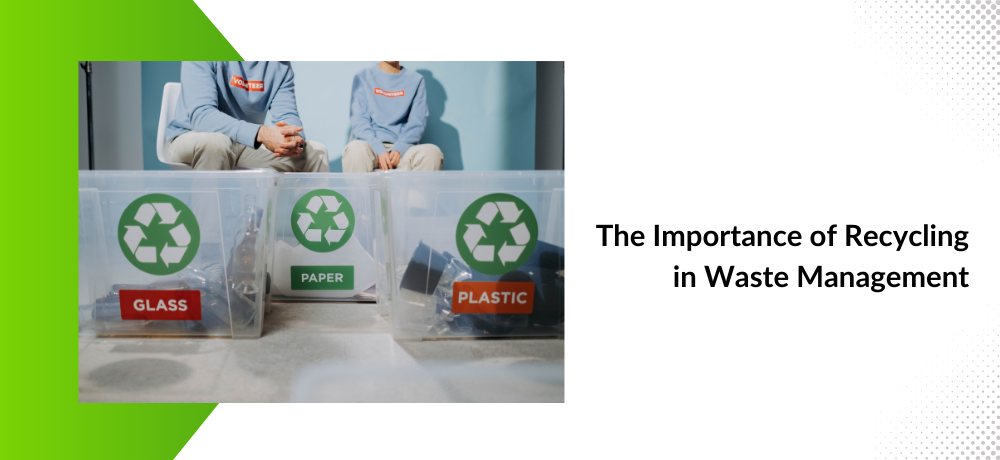The Importance of Recycling in Waste Management

Recycling is more than a buzzword; it's a pivotal component of responsible waste management. In this blog, we'll delve into the significance of recycling and how it plays a crucial role in reducing environmental impact, conserving resources, and fostering a sustainable future.
Resource Conservation in Waste Management:
One of the foremost advantages of incorporating recycling into waste management strategies lies in its ability to staunch the depletion of finite natural resources. In the conventional waste management paradigm, materials like paper, glass, and metals are often treated as disposable, necessitating constant extraction of raw materials from the environment. Recycling disrupts this linear approach by creating a closed-loop system, where materials are collected, processed, and reused, diminishing the reliance on virgin resources. By curbing the need for continuous extraction, recycling becomes a linchpin in sustainable waste management, addressing the critical issue of resource conservation.
Energy Savings Through Recycling:
Within the realm of waste management, the energy-saving prowess of recycling emerges as a significant catalyst for sustainability. Manufacturing products from recycled materials typically demands less energy compared to their counterparts crafted from raw materials. This energy efficiency is particularly pronounced in materials like aluminum, where recycling requires a fraction of the energy needed for primary extraction from bauxite ore. Consequently, integrating recycling into waste management practices mitigates the environmental impact of energy-intensive production processes and serves as a pragmatic approach to reducing overall energy consumption within the industrial landscape.
Waste Reduction and Landfill Diversion Strategies:
At the heart of effective waste management lies the imperative to diminish the volume of materials destined for landfills. Recycling, as an integral component of modern waste management strategies, accomplishes this by diverting reusable materials away from conventional disposal routes. By doing so, recycling extends the lifespan of existing landfill sites and alleviates the associated environmental and public health risks. This proactive approach to waste reduction transforms recycling into a cornerstone of waste management, mitigating the ecological footprint of landfills and fostering a more sustainable waste disposal ecosystem.
Pollution Prevention Through Recycling:
The symbiotic relationship between recycling and pollution prevention underscores the transformative potential of recycling within the waste management framework. Traditional methods of obtaining raw materials involve extraction, refinement, and processing, often accompanied by the release of pollutants and greenhouse gases into the environment. Recycling disrupts this cycle by providing an eco-friendly alternative, reducing the reliance on environmentally taxing industrial processes. Consequently, the integration of recycling into waste management practices becomes a powerful tool for pollution prevention, contributing to cleaner air, water, and soil.
Economic Benefits and Job Creation in the Recycling Sector:
Beyond its environmental impacts, recycling in waste management holds the key to economic revitalization and job creation. The burgeoning recycling industry, encompassing collection services, materials recovery facilities, and manufacturing, becomes a robust source of employment opportunities. By fostering the growth of this sector, communities can harness the economic benefits derived from efficient waste management practices. Moreover, the recycling industry acts as a crucible for innovation, driving advancements in technologies that enhance recycling efficiency. This synergy between waste management, recycling, and economic development positions recycling as a linchpin in the quest for sustainable and resilient communities.
Recycling is not just a personal choice; it's a collective responsibility. By understanding the importance of recycling in waste management, you become an active participant in building a more sustainable and eco-friendly future.
Ready to take the next step towards a sustainable future? Contact City Environmental Services Ltd today to learn more about our recycling solutions and how we can partner with you to make a positive impact. To learn more about the services we offer, please check out our website by clicking here. To contact us, please click here or call us at (416) 679-2489.